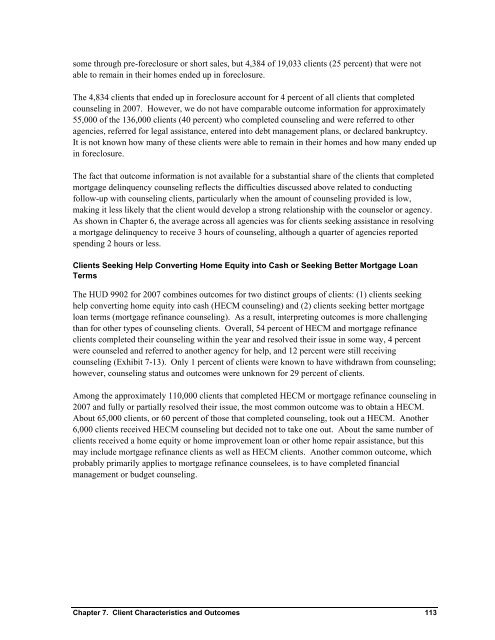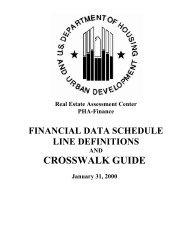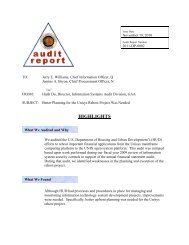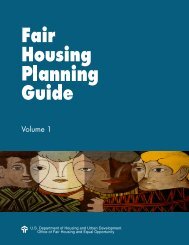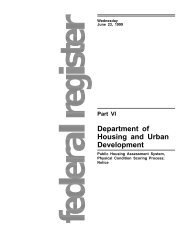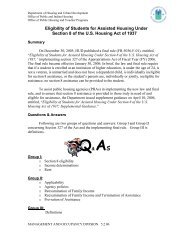Housing Counseling Process Evaluation and Design of ... - HUD User
Housing Counseling Process Evaluation and Design of ... - HUD User
Housing Counseling Process Evaluation and Design of ... - HUD User
You also want an ePaper? Increase the reach of your titles
YUMPU automatically turns print PDFs into web optimized ePapers that Google loves.
some through pre-foreclosure or short sales, but 4,384 <strong>of</strong> 19,033 clients (25 percent) that were not<br />
able to remain in their homes ended up in foreclosure.<br />
The 4,834 clients that ended up in foreclosure account for 4 percent <strong>of</strong> all clients that completed<br />
counseling in 2007. However, we do not have comparable outcome information for approximately<br />
55,000 <strong>of</strong> the 136,000 clients (40 percent) who completed counseling <strong>and</strong> were referred to other<br />
agencies, referred for legal assistance, entered into debt management plans, or declared bankruptcy.<br />
It is not known how many <strong>of</strong> these clients were able to remain in their homes <strong>and</strong> how many ended up<br />
in foreclosure.<br />
The fact that outcome information is not available for a substantial share <strong>of</strong> the clients that completed<br />
mortgage delinquency counseling reflects the difficulties discussed above related to conducting<br />
follow-up with counseling clients, particularly when the amount <strong>of</strong> counseling provided is low,<br />
making it less likely that the client would develop a strong relationship with the counselor or agency.<br />
As shown in Chapter 6, the average across all agencies was for clients seeking assistance in resolving<br />
a mortgage delinquency to receive 3 hours <strong>of</strong> counseling, although a quarter <strong>of</strong> agencies reported<br />
spending 2 hours or less.<br />
Clients Seeking Help Converting Home Equity into Cash or Seeking Better Mortgage Loan<br />
Terms<br />
The <strong>HUD</strong> 9902 for 2007 combines outcomes for two distinct groups <strong>of</strong> clients: (1) clients seeking<br />
help converting home equity into cash (HECM counseling) <strong>and</strong> (2) clients seeking better mortgage<br />
loan terms (mortgage refinance counseling). As a result, interpreting outcomes is more challenging<br />
than for other types <strong>of</strong> counseling clients. Overall, 54 percent <strong>of</strong> HECM <strong>and</strong> mortgage refinance<br />
clients completed their counseling within the year <strong>and</strong> resolved their issue in some way, 4 percent<br />
were counseled <strong>and</strong> referred to another agency for help, <strong>and</strong> 12 percent were still receiving<br />
counseling (Exhibit 7-13). Only 1 percent <strong>of</strong> clients were known to have withdrawn from counseling;<br />
however, counseling status <strong>and</strong> outcomes were unknown for 29 percent <strong>of</strong> clients.<br />
Among the approximately 110,000 clients that completed HECM or mortgage refinance counseling in<br />
2007 <strong>and</strong> fully or partially resolved their issue, the most common outcome was to obtain a HECM.<br />
About 65,000 clients, or 60 percent <strong>of</strong> those that completed counseling, took out a HECM. Another<br />
6,000 clients received HECM counseling but decided not to take one out. About the same number <strong>of</strong><br />
clients received a home equity or home improvement loan or other home repair assistance, but this<br />
may include mortgage refinance clients as well as HECM clients. Another common outcome, which<br />
probably primarily applies to mortgage refinance counselees, is to have completed financial<br />
management or budget counseling.<br />
Chapter 7. Client Characteristics <strong>and</strong> Outcomes 113


